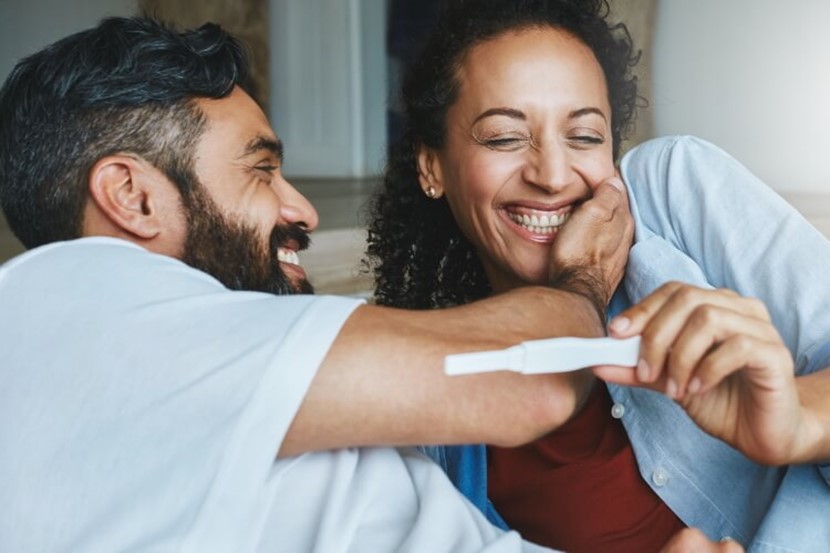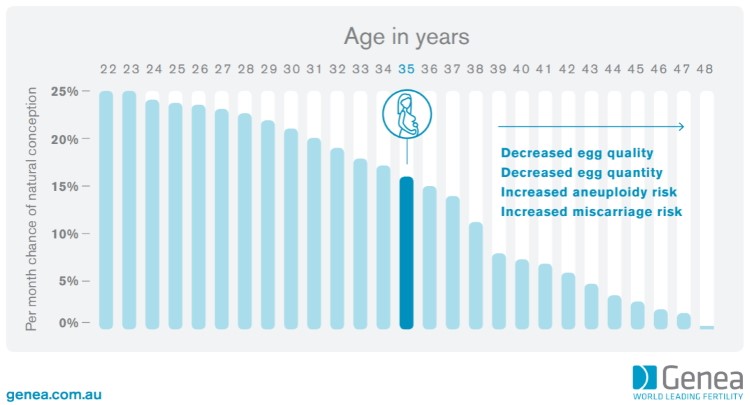Fertility facts for your forties

We’re starting our families later and later, but our body clocks remain the same. Pippa Henderson looks into why fertility declines, and what we can do when we fear we are running out of time.
I had my first baby two months shy of my 30th birthday. It turns out that (in this regard) I’m a perfectly average Kiwi woman. Plunket, as per standard practice, then hooked me up with a group of local women with babies the same age, and it was in this group that I started to fully appreciate what it looked like for mothers at either end of the age spectrum. We had a 19-year-old mother in our group, whose pregnancy had taken her by surprise. We also had a 46-year-old first time mother in our midst, whose pregnancy couldn’t have been more keenly anticipated. She’d conceived on her sixth and final round of IVF, which she and her husband had travelled to Australia for, as they weren’t eligible for treatment here in New Zealand. The first thing I noticed was that both of them were incredibly competent, capable and devoted mothers, with unique skills and perspectives to offer us all. As time went on and we spurred each other on through sleepless nights and changing family dynamics, our ages and back-stories somehow became irrelevant. Motherhood is a great equaliser. No matter what age you are when you become one there are benefits to that age. The unfortunate issue is that despite older mothers (I refuse to use the term geriatric) having so much to offer (life experience, confidence, financial security…) Mother Nature still favours younger women when it comes to conception. Fertility peaks at 22 then gradually declines from then on. As the average age of Kiwi mothers creeps higher and higher, our age-old biological clocks refuse to slow down.
Dr Andrew Murray of Fertility Associates states the delay in starting a family is the single biggest driver of the increase in couples needing to seek fertility help. Back in the early 1960s women were having, on average, three or four children each, and the most common age-group having children was women aged 20-24 – so in terms of alignment with fertility, these women had it bang on. It’s a very different story these days. In her article ‘When’s the best time to have a baby?’ Megan Nicol Reed, (columnist for Canvas magazine) shares that one month off her 43rd birthday, she finds herself at a curious point. “Three dear friends, all my age, have had babies recently. I watch them in awe and wonder. Marvel that their bodies were capable of producing life, that milk runs from them. And conversely, while these friends experience a last flush of fertility, another friend, also my age, has just become a grandmother.” She goes on to ask the pertinent question, “Is there an optimum age to reproduce?” and then sums up the current state of affairs in one articulate statement: “The problem, of course, is that the physiological ideal seldom intersects with the psychological.”
WHY DOES A WOMAN'S FERTILITY DECREASE WITH AGE?
Women are born with all the eggs they’ll ever have – approximately one to two million. By the time of their first period that number has dropped to approximately 300,000. By the age 35 there are about 25,000 left, and by the time a woman reaches menopause she is running out altogether. Unfortunately not only does the number of eggs fall as women age, but the quality of the ones they have left diminishes. So the older a woman is the higher percentage of ‘bad eggs’ she has, resulting in a lower chance of conceiving naturally.
WHAT ARE THE CHANCES?

As this chart (from OHbaby!'s article The impact of age) shows, women’s fertility falls dramatically in our late 30s. At age 35, the chance of conceiving naturally and having a baby is around 16% per month, by age 40 it is 6%, and by 45 it drops to about 1%. Conceiving and giving birth using your own eggs after the age of 45 is extremely rare. Unfortunately the incidence of miscarriage increases with maternal age. By age 40 about 40% of all conceptions end in miscarriage.
WHAT CAN WE DO?
1. Be aware of the facts
We may be seeing and hearing of more and more women having babies at forty and beyond, but it’s important not to overestimate the age when fertility declines, and the extra risks involved. These include pregnancy complications such as gestational diabetes and high blood pressure, a greater risk of delivery complications, a preterm baby, and of genetic problems. In OHbaby!'s article Time waits for no ovary Dr Andrew Murray points out we are as fertile as we ever have been – we are just leaving it until a time that the background chances to conceive have naturally reduced. He reminds us that technology has changed our lives in many ways, but reproduction is one area where Mother Nature still holds a strong influence. He suggests that as a society we encourage men and women to consider family planning as part of their career planning, and design more roles that allow for part-time contributions.
2. Seek help early
In OHbaby's article Infertility – when to seek help fertility expert Dr Richard Fisher questions the way that the term infertility is traditionally used after a couple has been trying to get pregnant for a year or more. “Clearly this is not entirely sensible… Older couples…face the dilemma that while delay in conception is normal, it also means that treatment (should any be required) won’t start until the chance of conception has deteriorated further.” He says the only women for whom waiting a year seems sensible are those aged between 30-35.
Dr Fisher also talks about the importance of psychological counseling as part of the initial assessment of sub-fertility, as it helps set strategies in place to deal with the stresses of delay, potential treatment and potential conflicts. He says his best advice for couples would be to present early for an assessment of the likelihood of problems and then establish a rational plan about intervention, if and when it becomes necessary. His advice to families and close friends of couples who express their concerns about sub-fertility is to listen carefully, to empathise and to avoid giving gratuitous advice based on no real knowledge of the underlying problem. Telling someone to relax when the problem they have is causing them to be stressed is unhelpful. Advising about treatment without understanding that particular couples’ problem is unhelpful too.
There is a simple blood test called Anti-Mullerian Hormone (AMH) test that can suggest when a woman might have lower fertility than expected for her age, which is obviously helpful when considering timing and the option of preserving eggs for the future. Egg-freezing is a technique offered by Fertility Associates. If this is something you are considering it is important not to delay, as the younger the woman is at the time of freezing her eggs the more likely she is to produce viable embryos.
MIRACLES DO HAPPEN
Kiwi woman Cath, 44, and her partner Johno, 46, who she met abroad, have recently welcomed baby Isaac into the world. Isaac is Cath’s first baby, and was completely unexpected! She feels incredibly lucky and happy. Johno already has three children, but much to Cath’s delight and relief he was very happy to welcome a fourth. She shares her story below:
“I'd given up the idea of having a baby and considered myself childless for quite a few years. I had joined a site in the UK that supports childless women, just a support group, and had some therapy, which ends up being a kind of grieving process. Then I got together with Johno after his marriage broke up permanently a few years ago. We had always been quite good friends and he worked nearby. I believed I had very low fertility due to my age and polycystic ovaries. At the age of 44 my chances of pregnancy were very slim... but as it turns out ... not so. We’d been together a year when I got pregnant. We were not trying to have a baby, I was not always careful and Johno wasn’t too phased by that. Either I'm a lucky statistical anomaly or the statistics aren't always right. Isaac was completely natural.
I remember listening to an interview with Lord Robert Winston about fertility in your 40s and he said that your best chance of a baby over 40 is not fertility clinics, but to have a lot of sex. That will increase your chances. That was a relief to hear because fertility clinics are very expensive! Obviously some women's last hope is a fertility clinic but it wasn't my choice. I made a decision that I wouldn't go to any length to have a baby and I'd have to be in a good strong relationship first. I left it to the heavens ultimately. I was so elated and happy and scared when I saw a positive pregnancy test! I'll never forget the moment Isaac was born and I heard his first cry.”

